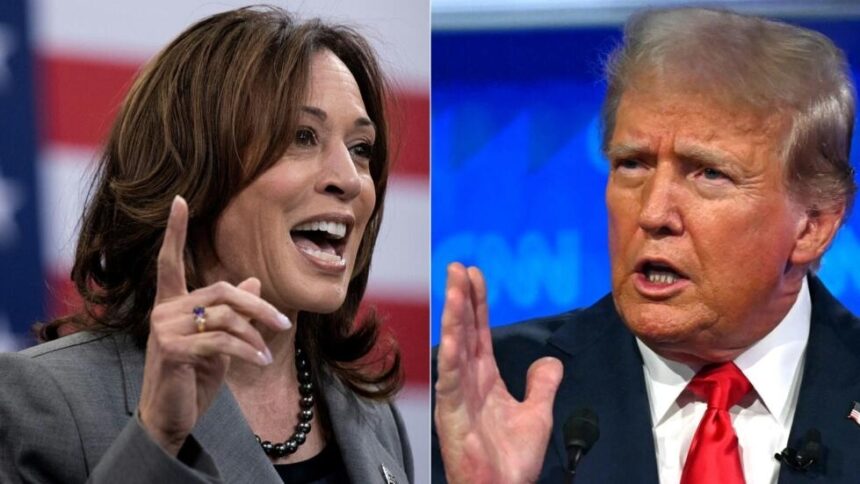The article argues that regardless of whether Kamala Harris or Donald Trump shapes U.S. foreign policy, America’s strategy towards Africa is likely to remain consistent. It highlights that U.S. policy in Africa has historically been driven by broader geopolitical interests rather than individual leadership styles. The focus will likely continue on security, economic interests, and countering China’s influence in the region, with limited changes in approach despite potential leadership differences.
Overview
- Historical Context: U.S. policies towards Africa have been inconsistent, with significant engagement during the Cold War but neglect in the post-Cold War era, except for humanitarian aid through USAID.
- Current Engagement: The U.S. remains the largest single aid donor globally, focusing on “soft” projects like education, health, and governance, rather than “hard” infrastructure projects.
Comparison with China
- Infrastructure Investment: China’s Belt and Road Initiative (BRI) has significantly outpaced U.S. investment in African infrastructure. In 2018, China committed $25.7 billion to African infrastructure, compared to the U.S.’s $297 million.
- Political Influence: China has increased its influence in Africa through UN peacekeeping contributions and control of UN agencies, while U.S. political visits to Africa have been minimal.
Future Outlook
- Policy Continuity: The article argues that U.S. strategy towards Africa is unlikely to change significantly, regardless of the election outcome. Both Harris and Trump are expected to maintain the current focus on humanitarian aid and soft projects.
- Strategic Importance: Despite Africa’s growing population and economic potential, the U.S. has not prioritized the continent in its foreign policy, unlike China, which has made Africa a key focus of its international strategy.
Conclusion
The article concludes that America’s strategy towards Africa will likely remain unchanged, focusing on humanitarian aid and soft projects, while China continues to dominate in infrastructure investment and political influence.
Read more below.
Harris or Trump: America’s Strategy Towards Africa Unlikely to Change Much
With both Kamala Harris and former Donald Trump intensifying their presidential campaigns, the implications for foreign policy are many. For one continent, however, America’s policies are unlikely to change regardless of who wins the upcoming election.
With Africa’s population currently at 1.4 billion and projected to reach 2.5 billion by 2025, the “African Century” seems imminent. Despite ranking second in this year’s Lowy Institute’s Diplomacy Index, which measures countries’ diplomatic networks, engagement levels, and potential influence, the US pays little diplomatic attention to Africa. This situation is unlikely to change, regardless of who becomes the next president.
Historically, America’s policies towards the African continent have been inconsistent. During the Cold War, Africa was seen as a crucial ally of the US-led system, with several proxy wars fought on African soil. However, after the Cold War, Africa was often neglected in America’s foreign policy, although humanitarian support continued mainly through the United States Agency for International Development (USAID). Even though the United States is the largest single aid donor globally, contributing US$9.5 billion in humanitarian aid in 2023 alone, its funds have predominantly supported “soft” projects such as education, health, and governance. This emphasis has often come at the expense of “hard” projects, including roads, railways, and other critical infrastructure.
Africa’s infrastructure sector, according to the African Development Bank, requires between $130 and $170 billion in annual investment. China, through the trillion-dollar Belt and Road Initiative (BRI) has been a key player in infrastructure finance in Africa, committing $25.7 billion to African infrastructure projects in 2018. The US committed only $297 million that year. Chinese companies win half of all infrastructure projects in Africa, although concerns about transparency have been raised.
In the political domain, China, which only assumed a seat at the UN in 1971, now controls four of the 15 UN agencies and is one of the five permanent members of the UN Security Council. As of May 2024, China contributed 1,802 military and police personnel to UN peacekeeping and committed US$1 billion to a fifth of the UN peacekeeping standby force. Notably, nearly all of the Chinese peacekeepers are deployed in Africa. Neither Joe Biden nor Donald Trump visited the African continent during their presidencies, and visits by American officials to Africa have been minimal. In contrast, for over three decades, every Chinese foreign minister’s first visit abroad is traditionally to Africa.
Russia has similarly expanded its political and security presence on the continent through the Wagner Group, a paramilitary organisation now incorporated into the Russian army, challenging US security engagements in Africa.
American presidents from both the Republican and Democratic parties have generally treated Africa with a similar mix of neglect and intermittent engagement. President George W. Bush, for instance, initiated the President’s Emergency Plan for AIDS Relief to provide HIV/AIDS treatment and launched the Millennium Challenge Corporation to fund development projects in Africa. Donald Trump established the U.S. International Development Finance Corporation to counter China’s BRI by promoting private sector investment in Africa. He also launched the Prosper Africa initiative to increase trade and investment. Bill Clinton initiated the African Growth and Opportunity Act (AGOA) to boost trade by providing duty-free access to the US market for African products. Barack Obama initiated the Power Africa program to increase access to electricity, as well as the Young African Leaders Initiative to empower young African leaders.
Although analysts say the Biden administration’s aid budget is the highest since the mid-1980s, the recent $95 billion foreign budget allocates $61 billion to Ukraine, $26 billion for Israel and Gaza, and $8 billion for the Pacific to counter China, with only a tiny portion directed towards the rest of the world, including Africa. Electing another Democratic president is unlikely to bring dramatic changes to Africa policy. As the AGOA arrangement expires in 2025, concerns over its future have emerged. Since its enactment in 2000, AGOA provided duty-free access to the US market for over 1,800 products, although America’s trade with Africa was only US$44.9 billion in 2021, compared to US$ 254.3 billion with China and Africa in the same year.
In October 2023, Uganda, the Central African Republic, Gabon, and Niger were thrown out of AGOA by Biden due to gross violations of internationally recognised human rights. This follows the previous expulsion of Rwanda in 2018 by President Donald Trump due to Rwanda’s ban on second-hand apparel from the US, intended to encourage local textile industries. The suspension of Rwanda, especially, raises questions about the true intentions of the AGOA program.
In January 2018, former President Trump made the controversial “shithole countries” remark while expressing frustration with illegal immigrants from Haiti and African countries. Although he was often checked by Congress, Trump attempted to cut billions of dollars in aid and reduce the diplomacy and humanitarian budget, which would affect support to the African continent. In his reelection bid, Donald Trump vows to continue with the “America First” program, implement tough immigration laws, and cut foreign aid, including to Ukraine.
If support for Ukraine and Gaza is threatened by Trump’s policies, it is unlikely that America will do much to address the conflicts tearing apart the African continent. Trump has stated that American aid should go to friends and allies. Put differently, American taxpayers’ money is not for countries like those in “Africa” and “Haiti” that do not embrace American values.
Descending from Jamaican and Indian parents, and attending the historically black research institution Howard University in the US, Kamala Harris appears to be the candidate with closer connections to the African and Asian continents. In fact, Harris visited Ghana, Tanzania, and Zambia in March and April of 2023, during which she promised to unveil the non-profit Partnership for Digital Access in Africato connect one billion people in there to the internet by 2030 and to increase connectivity for women and girls from 30 percent to 80 percent. While these are certainly good signs that Africa will receive consideration in America’s diplomacy, whether this will translate into enhanced collaborations with the continent, especially in the domains of trade, investment, and infrastructure, is yet to be seen. Post-Covid-19 America is bogged down with serious domestic issues: inflation, gun crime, and immigration are likely to dominate the focus of the next American president, while the strategic priorities and geopolitical realities that have historically shaped US engagement with the continent will most likely continue to do so.
The upcoming American elections are unlikely to bring significant changes in US policies towards Africa. The continent will likely remain a secondary concern in the broader context of US foreign policy but may receive even less attention if Trump is reelected. The primary focus of US foreign policy will likely remain on addressing challenges posed by major powers such as China and Russia, as well as dealing with issues in the Middle East and Indo-Pacific regions, on top of domestic economic, health, crime, and migration challenges.
Joel Odota – a final-year Master of Politics and International Relations student at The Australian National University. His research interests focus on China-Africa relations, the geopolitical competition between China and the United States, and the agency of African nations in global politics.







